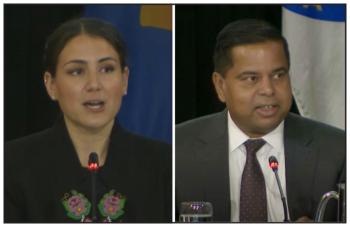Image Caption
Summary
Local Journalism Initiative Reporter
Windspeaker.com
Updated Feb. 6 with clarification on the co-development principles.
Legislation may be the only way to ensure that a possible change in the federal government in the next election does not see the Métis National Council (MNC) lose ground.
In 2017, member Nations of the MNC signed the Canada Métis-Nation Accord with the Trudeau Liberal government. The accord led to the establishment of a permanent bilateral mechanism in 2019 to open regular communications between the MNC and the federal government.
“The most permanent way of institutionalizing the process would be through legislation,” MNC President Cassidy Caron told Windspeaker.com on Monday. “Looking to make sure that that is implemented and understood throughout the public service, that's another way of ensuring that, hopefully, it lasts through a potential government change, and it involves building relationships on all sides.”
Such legislation would be separate from Bill C-53, which is presently before the Indigenous and Northern Affairs committee, going through a clause-by-clause assessment. It provides for the recognition of certain Métis governments in Alberta, Ontario and Saskatchewan.
“There have been some downfalls in the process (of the Canada Métis-Nation Accord) over the last number of years,” said Caron. The accord promised scheduled access to Prime Minister Justin Trudeau and Cabinet ministers. However, that did not happen.
The accord has also not provided the MNC with a clear understanding of how Métis are “implicated” when Cabinet rolls out specific initiatives, legislation, policy funding, and funding mechanisms. Caron says that when MNC members have asked for details on these things, they have been told the discussions are “confidential conversations.”
However, the accord has resulted in the signing of seven sub-accords with sustainable funding for either five- or 10-year periods, including in the areas of housing, homelessness, skills and employment training, and economic development.
On Jan. 31, the MNC, along with its representative Métis Nation governments from British Columbia, Alberta, Saskatchewan and Ontario, met with Cabinet ministers and the president of the Treasury Board, Anita Anand.
“That was the first time that we had Treasury Board attend one of our permanent bilateral mechanism meetings and that sends a strong signal that (the federal government is) committed to this process and continuing to make progress,” said Caron.
Joining Anand was Crown-Indigenous Relations Minister Gary Anandasangaree and Indigenous Services Minister Patty Hajdu, plus ministers from Northern Affairs, Innovation, Science and Industry, Justice, and Health.
Caron says ministers Harjit Sajjan (Emergency Preparedness) and Dominic LeBlanc (Public Safety) had also been invited to the meeting, but could not attend due to scheduling conflicts.
“We had hoped to have…a more in-depth conversation about emergency management and the current lack of support from the federal government for our Métis governments with respect to that,” said Caron.
She added that MNC is also in the process of negotiating a public safety accord that includes Justice, but Leblanc’s absence put a damper on that.
However, the MNC did leave the meeting with $500,000 to support capacity building towards the co-development of a Métis Nation federal elementary and secondary school education policy. That policy will fill the gap that presently exists. The MNC signed sub-accords for early learning and childcare, and post-secondary education.
Although education falls within provincial jurisdiction, Caron explained that “we're not looking to tell the provinces exactly how to teach Métis children, but we're looking at different ways of being able to support Métis families, support their children, through the system.”
The meeting also resulted in the furthering of co-development principles that have been drafted and negotiated over years. Caron says the principles aim to remove barriers, including those put up by Cabinet confidences.
“The co-development principles are so incredibly important because it creates an understanding of how we want the relationship between Canada and the Métis Nation to look,” said Caron.
She points to proposed federal health legislation as an example. She says Métis Nation input has not been reflected in any of the documents they have received.
“We're in the process right now of looking at a new pathway forward for meeting specific health legislation and that we can use the co-development principles with Indigenous Services Canada to ensure that if maybe specific health legislation goes forward, it is going to be inclusive of what the needs are, and how we understand the solutions to equitable health care for the Métis Nation,” she said.
The co-development principles have been endorsed by both sides and will be going to a meeting tentatively set for May when Trudeau will “sign off” on them, she said.
While Caron is encouraged by what she sees as “resetting the relationship and receiving the commitment from the federal government to the process,” she says the government’s full commitment will show when it comes to tabling the next budget.
“We can talk about these priorities, we can agree to joint priorities over and over and over again…but unless we have the capacity, including the financial capacity to do so, we can't move forward on these priorities,” said Caron.
Support Independent Journalism. SUPPORT US!

